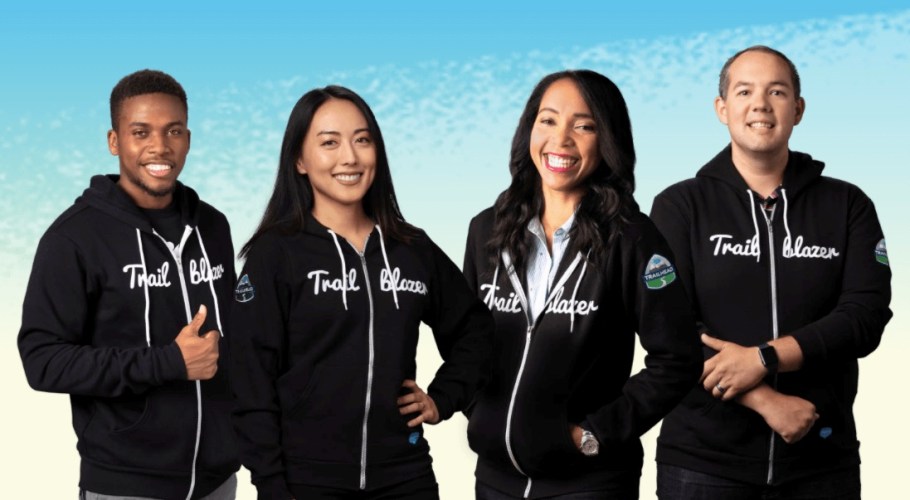There’s a problem with diversity in hi-tech.
Hispanic and Black employees make up just 7% and 9% of science, technology, engineering, and math (STEM) jobs respectively, despite representing a larger share of the American workforce. And women’s representation in computer jobs has steadily been on the decline since 1990. This lack of diversity in hiring has been noted in numerous publications including The Atlantic, The Economist, and WIRED.
Yet studies have shown time and again that a diverse workplace is a more profitable one. And inclusive hiring practices geared toward underrepresented groups in tech (specifically women, Black, Latinx, Indigenous, multiracial, LGBTQ+, people with disabilities, veterans, and military spouses) result in diversity of thought and new perspectives. This is why we’re excited about our Salesforce Talent Alliance; now a network of 280+ Salesforce organizational partners from 40 countries who have committed to working with us to grow and diversify the Salesforce ecosystem.
The Salesforce Talent Alliance
In partnership with our workforce development programs, the Salesforce Talent Alliance, brings new talent into the ecosystem to build a more diverse workforce that more closely reflects the global population. Job seekers are trained to become Salesforce-certified professionals, making them more hirable, increasing their earning potential, and catapulting their career trajectory.
Will Wright was hired at Slalom Consulting, one of the partners in the alliance, in March 2020. He was connected to the company through Salesforce Military, a Talent Alliance workforce development partner that provides free Salesforce training for veterans and military spouses, as well as connections to career opportunities. As a Black U.S. Army veteran, Wright learned of the group through Four Block, a program aimed at helping high-potential veterans transition from the military into a civilian career. Now a five-time Salesforce-certified technical analyst, Wright uses his skills to implement new technologies for partners. And in his personal volunteer work, he serves homeless and veteran communities in Seattle.
“Salesforce Military was phenomenal, helping support me and locate employers who are hiring, and helping to make that connection between me and the employer,“ Will said. ”I talk about Salesforce Military to all of my friends who are veterans. I let them know there are opportunities out there that are free and provide a support network along the way.”
Partnering for equality
As part of the alliance, organizational partners commit to devoting 20% of annual hiring to new Salesforce professionals (those with six months or less of Salesforce experience) and adopting inclusive hiring practices. To support their hiring efforts, partners receive connections to a diverse talent pipeline and resources to build their Salesforce practice.
By committing to more inclusive hiring practices, NuAge Experts has seen tremendous benefits in its talent pool and output, including a more positive workplace culture and the addition of highly-qualified team members. For example, in just 14 months, one NuAge new hire was named a Salesforce 2020 Marketing Champion, received seven certifications, and is now seen as an industry expert.
“The most inspiring thing about the Salesforce Talent Alliance is connecting with candidates who we might not have otherwise been introduced to and being able to diversify our team,” said Cate Robbie, director of human resources, NuAge Experts. “They’re passionate about learning Salesforce and excited to collaborate with the team. They bring in new ideas and perspectives, and their positive energy is infectious.” NuAge Experts is one of many companies finding success from more inclusive hiring practices. “The new candidates are coming with a lot of useful skill sets,” said John Flaherty, chief operations officer and general manager, Americas at PolSource. “What was really compelling was the level of maturity and the real-world experience they have dealing with high-pressure situations, overcoming obstacles, and leading teams — qualities you may not typically see in someone coming straight out of college.”
Bigger than business
At Salesforce, we believe in building a workforce that better represents society — not just internally, but through our partners and customers. This includes building and empowering workforce development programs that widen access to the tech industry by training and enabling a diverse workforce. With our partners and customers at our side, we’re prepared for a more thriving future built from the expertise and passion of diverse Trailblazers.
“As we build the economy of the future, we must bring along the workforce of today,” said Marc Benioff, chairman and chief executive officer of Salesforce. “Salesforce is committed to empowering people from every background with the skills they need to build careers and thrive in the digital economy.”
Talent is everywhere, so where’s the disconnect?
Employers often cite low access to more diverse candidates and a “denominator problem” present in large tech companies that try to retrofit for diversity after going through massive growth spurts. But studies have found that members of majority groups tend to underestimate the day-to-day obstacles that diverse employees face. Given this, Big Tech must not only adopt robust, consistent anti-discrimination policies, but it also needs to pioneer and participate in training and recruiting programs that mitigate biases and increase opportunities for underrepresented groups.
What’s next?
- Join the Salesforce Talent Alliance
- Watch now: Talent Alliance Trailblazer




























